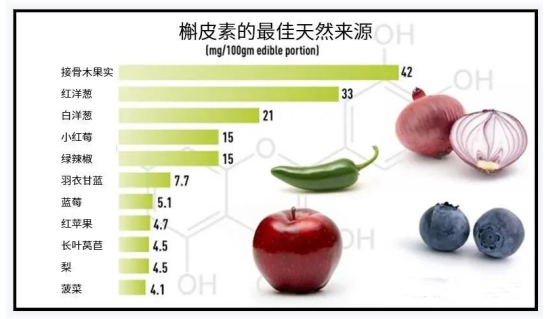Quercetin is the main active ingredient in sophora rice. Quercetin is a flavonoid compound that can activate muscles and veins, prevent lipid peroxidation in the body, effectively fight free radicals, and inhibit leukemia, prostate cancer, and colorectal cancer. It can inhibit the growth and reproduction of various cancer cells such as liver cancer, breast cancer, and tumors. It is also a natural plant dye that can not only be used as a natural pigment for food, but also as a dye for textiles.
So, what are the health benefits of quercetin?
Research shows that as a new pharmaceutical raw material and dietary supplement, what are the benefits of quercetin?
1.Quercetin improves aerobic exercise performance
Physical inactivity is a widespread problem worldwide, with approximately two-thirds of adults not achieving the minimum recommended physical activity. Exercise training, such as aerobic exercise, not only promotes an individual’s physical health but may also affect psychological well-being. Since physical and mental states are often interdependent, decreased physical abilities may lead to decreased self-esteem.
Multiple studies report that regular and moderate exercise training can reduce the risk of cancer, heart disease, diabetes, osteoporosis, obesity, anxiety and depression
2.Helps relieve allergies
Quercetin in sophora rice extract has potential anti-allergic properties, which can block enzyme factors related to inflammation, inhibit the production of chemical substances, and relieve allergic symptoms;
3.Helps fight cancer
Quercetin is an antioxidant that can inhibit the growth of prostate cancer cells and induce apoptosis of cancer cells. It has effects on liver, lung, breast, bladder, blood, colon, ovary, lymph and adrenal cancer cells, improving and prevention of human cancer.
4.Helps reduce chronic brain tumors
Studies have shown that quercetin is beneficial in preventing degenerative brain diseases (Alzheimer’s disease and Alzheimer’s syndrome), stimulating the nervous system, relieving pressure on brain nerves, and effectively preventing and reducing chronic brain tumors;
5.Helps lower blood pressure and blood sugar
Quercetin is beneficial to lowering blood pressure levels, relieving the contraction and relaxation of blood vessels, regulating the acid-base balance of blood, balancing blood concentration, and effectively lowering blood pressure;
6.Helps delay aging
Quercetin is a natural antioxidant factor that helps eliminate aging and damaged cells, helps fight aging, accelerates skin metabolism, increases skin collagen, and prevents skin aging;
7.Helps fight depression
Sophora japonica extract can increase the content ofc-aminobutyric acid and glutamic acid in the brain, increase brain excitement, enhance mobility, reduce anxiety active factors in the brain, and effectively fight depression.
8. Helps fight inflammation
Studies have shown that sophora quercetin can reduce inflammatory markers (tumor necrosis factor and interleukin molecules) in human cells. For rheumatoid arthritis, it can quickly and effectively relieve stiffness in the legs and feet of patients with rheumatic diseases. After exercise, Pain, difficulty walking, etc. It is an effective supplement for treating inflammation;
Domestic and foreign research: Quercetin has remarkable effects on pulmonary nodules, lung cancer, pulmonary fibrosis, COVID-19, etc.!
Quercetin is a natural flavonoid compound that is widely found in the flowers, leaves, and fruits of various plants and has a wide range of pharmacological effects. In recent years, domestic and foreign scholars have increasingly conducted pharmacological research on quercetin, and its application in respiratory system diseases includes respiratory system tumors, pulmonary fibrosis, lung damage, respiratory viral infections, etc., with remarkable effects.
Foreign research: Quercetin “pulmonary nodulin” antioxidant reduces the occurrence of inflammation
Supplementing quercetin can improve antioxidant defense, manifested by an increase in total plasma antioxidant capacity. Additionally, quercetin supplementation reduced oxidative stress and inflammatory markers in the blood of sarcoidosis patients. The effects of quercetin supplementation were more pronounced when levels of oxidative stress and inflammation markers were higher at baseline.
Using antioxidants such as quercetin can reduce the occurrence of oxidative stress and inflammation. Long-term supplementation of antioxidants (such as quercetin) in patients with sarcoidosis can further improve lung function.
Domestic research: Quercetin and other core ingredients in preventing and treating new coronavirus pneumonia!
Quercetin significantly reduced LPS-induced TNFaand IL-8 production in vitro in both groups in a concentration-dependent manner. Interestingly, this quercetin effect was more pronounced in patients with sarcoidosis. Endogenous antioxidant defenses are significantly reduced in sarcoidosis, indicating that oxidative stress is the pathological basis of the disease. Furthermore, the inflammatory state is significantly enhanced in patients with sarcoidosis. Results regarding the effects of quercetin on cytokine production suggest that patients with sarcoidosis benefit from supplementation with the antioxidant quercetin, not only by enhancing protection against relatively low reactive oxygen species, but also by reducing the occurrence of inflammation.
Clinical studies have shown that its significant efficacy is closely related to its ability to reduce the inflammatory response of the damaged body and inhibit the initiation of “inflammatory storm”; modern pharmacological research has also shown that its common core ingredients for exerting its efficacy
Quercetin Quercetin has extensive pharmacological effects on lung cancer, pulmonary fibrosis, lung bronchial injury and infection!
1) Quercetin anti-lung cancer: Quercetin can inhibit the growth of lung adenocarcinoma cell A549 in a certain time- and dose-dependent manner.
2) Quercetin resists pulmonary fibrosis: Quercetin inhibits fibroblast proliferation, inhibits collagen synthesis, prevents oxidative damage, inhibits angiogenesis, etc., reduces the risk of pulmonary failure, gas exchange disorders, respiratory failure, and improves respiratory function.
3) Protect lungs and bronchi: Quercetin inhibits the release of P-selectin. Inhibiting the expression of adhesion molecules such as P-selectin partially prevents the adhesion of polymorphonuclear leukocytes (PMN) to endothelial cells, thereby blocking the transmembrane movement of PMN and their “seizure” in the lungs, thus achieving the prevention of acute lung injury. Protective effects.
What foods also contain quercetin?
Quercetin is found naturally in many plant foods, especially in the outer layers or peels of fruits.
Good food sources include: capers, peppers, onions, shallots, asparagus – cooked, cherries, tomatoes, red apples, red grapes, broccoli, kale, red leaf lettuce, cranberries, blueberries, raspberries, etc. .
Mobile Phone: 86 18691558819
Irene@xahealthway.com
www.xahealthway.com
https://healthway.en.alibaba.com/
Wechat: 18691558819
WhatsApp: 86 18691558819
Post time: Jan-05-2024







